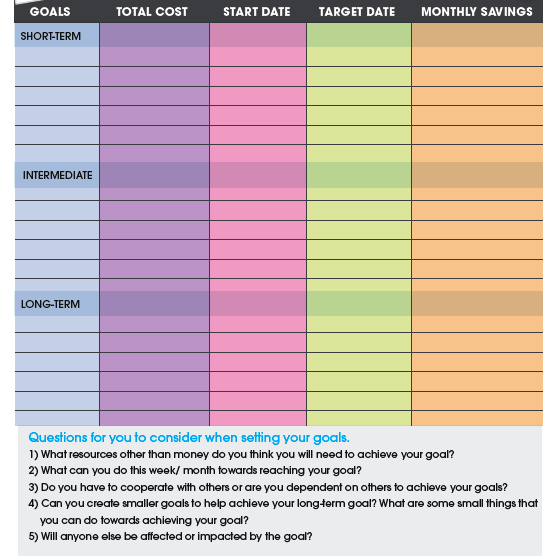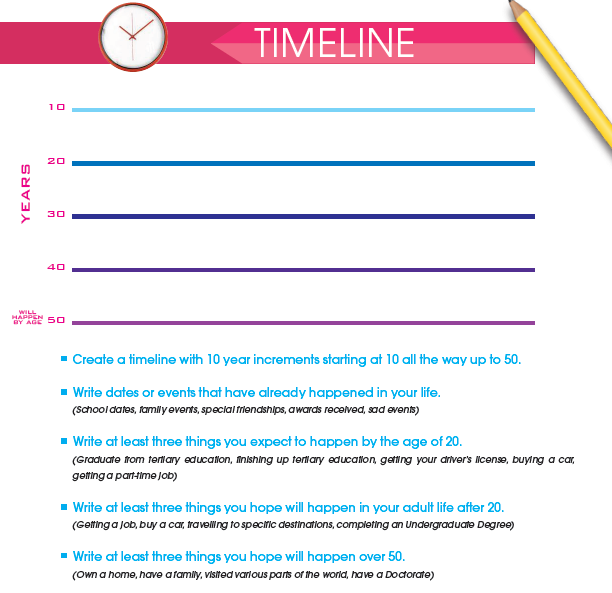[heading tag=”h2″ align=”center” color=”#000″ style=”lines” color2=”#000″]Learning Objectives [/heading]
-
Define financial goals
-
Differentiate among short, medium and long-term goals
-
Describe how money impacts the achievement of goals in terms of saving and investing
-
Develop techniques for setting goals
[heading tag=”h2″ align=”center” color=”#000″ style=”lines” color2=”#000″]What is a Financial Goal [/heading]
A financial goal is something one aims for over time and which requires money to achieve. These goals are sometimes widely shared for instance wanting to attend University or owning a vehicle.
Other universal goals include:
- Travelling
- Starting and owning your own business
- Retiring comfortably, with a reasonable expectation that you will have adequate income for as long as you need it.
[heading tag=”h2″ align=”center” color=”#000″ style=”lines” color2=”#000″]Goal Setting [/heading]
Goal Setting
Once you are aware of your financial goals you may work with an investment professional or financial planner to assign a realistic time-frame, a price tag and the kinds of saving and investing strategies that may be appropriate for achieving these goals. Always ensure that you consult a registered financial or investment adviser.
Understanding Short, Medium and Long-term Goals
All goals fit into one of these categories and part of goal-setting also involves estimating when you will need the money.
Short-term goals are those that can be achieved within a short time frame – within two to four months.
QUESTION:
What type of realistic financial goals could you set within this timeframe? This will be determined by the amount of money you can save over this period of time and this will vary from individual to individual based on your daily, weekly and monthly income. Examples of this include: saving to buy a graduation dress, or a pair of shoes; saving for a new school bag/or sports gear.
Medium-term goals are those that can be achieved within four to six months, or even up to one year or two.
QUESTION:
What type of realistic financial goals could you set within this timeframe? Again this will be determined by the amount of money you can save over time and this will vary from individual to individual based on your daily, weekly and monthly income. Examples of this include: saving to buy a tablet (electronic device), a cell phone; or a computer.
Long-term goals usually refer to goals set for three or more years.
What type of realistic financial goals could you set within this timeframe? Again this will be determined by the amount of money you can save over this timeframe and this will vary from individual to individual based on your daily, weekly and monthly income. Examples of this include: saving for tertiary education, a new car, a home or a vacation.
QUESTION:
What is the relationship between short/medium term and long-term goals?
One can set short or medium-term goals towards achieving long-term goals. This process helps to make the long-term goal more achievable. For example – Sheldon saves $50 a week for two years to be able to buy a laptop costing $2600. Sheldon needs to save $1300 by the end of each year to be able to reach his goal. He ideally needs to save approximately $7 a day for two years. Checking in every six months will help to gauge his progress over time, and assess whether he needs to adjust his time-frame for meeting these goals.
[heading tag=”h2″ align=”center” color=”#000″ style=”lines” color2=”#000″]Activity: Setting Your Goals (Worksheet)[/heading]
[heading tag=”h2″ align=”center” color=”#000″ style=”lines” color2=”#000″]SMART Goals [/heading]
[heading tag=”h2″ align=”center” color=”#000″ style=”lines” color2=”#000″]Goal Setting[/heading]
Goal Setting with a Partner
With the help of a partner, practice goal-setting. Working with others to set goals can help to realise your own goals. It is the way that many teams and businesses operate. Each partner will help the other accomplish a specific goal over the period of one or two weeks.
Review each contract at the end of the period to ensure that the financial goal met the necessary requirements of a short-term goal.
After a week, revisit the contracts and answer the following:
- Did you achieve your goal?
- Was it a difficult task?
- Why or why not? People set goals all the time and may not achieve all of them. Some people give up or set another goal that is more achievable and realistic)
- How did your partner help you to achieve your goal?
- Did you need additional help?
- What obstacles did you encounter? (Competition; priorities; peer pressure; lack of money and other resources; the goal may not seem important at this stage in life)
- Did you have to sacrifice anything?
- Did your actions have an impact or affect anyone else?
[heading tag=”h2″ align=”center” color=”#000″ style=”lines” color2=”#000″]Activity: Goal Setting Contract[/heading]
[heading tag=”h2″ align=”center” color=”#000″ style=”lines” color2=”#000″]Activity: Goal Setting Timeline[/heading]
[heading tag=”h2″ align=”center” color=”#000″ style=”lines” color2=”#000″]Activity Sheets for Download[/heading]
- Activity 1- Setting your Goals worksheet
- Activity 2 – Goal Setting Contract
- Activity 3- Goal Setting Timeline








